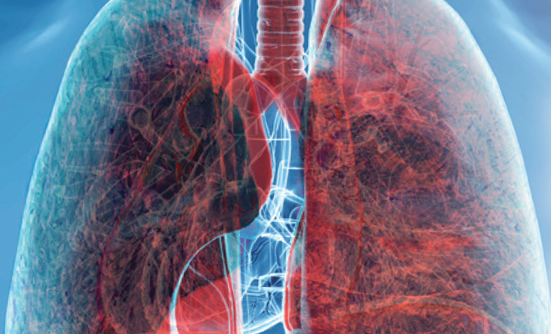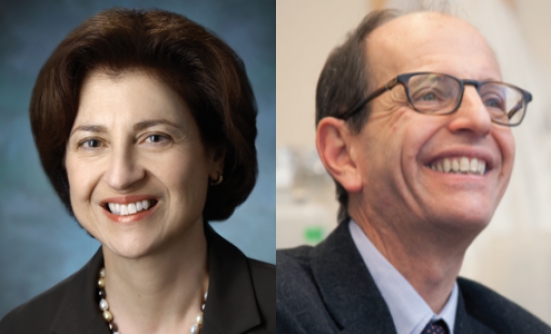Many people associate lung cancer with smoking, but many patients with lung cancer are not smokers. Even though lung cancer is the leading cause of death from cancer in the United States and worldwide, the majority (68%) of patients with advanced cancer who have never received cancer care have lung cancer. Because 1 in 15 people will have lung cancer in their lifetime, it is important to understand why lung cancer is seen in a negative way by the public. Holli Kolkey, of Genentech, discussed with CONQUER some of the barriers to lung cancer treatment and the role of genetics in this disease.
Q. What are some of the barriers to lung cancer care?We presented new research at this year’s International Association for the Study of Lung Cancer meeting that found that 3 of 4 people have a negative attitude about lung cancer compared with breast cancer, and the majority of people associate lung cancer with shame and hopelessness. This negative bias was consistent among the general public, patients with cancer, and healthcare professionals. We explored if there were specific demographic factors associated with these biases in lung cancer compared with breast cancer, and whether these biases affect the treatment rates for lung cancer.
We found that bias against lung cancer was associated with race, gender, education, income levels, and cancer knowledge. Conscious bias was stronger among women, whites, caregivers, people with higher incomes, and those reporting themselves with more knowledge about cancer. Subconscious bias was stronger among women, whites, people with higher education, and people who do not have cancer.
Many patients with advanced lung cancer never receive care, far more than for any other type of cancer, and these biases may be a factor in the low treatment rates. This research is part of our commitment to better understand barriers to lung cancer care through The Lung Cancer Project, which was launched through our partnership with 20 leading advocacy groups and industry organizations to address and remove the social stigma and other barriers faced by patients with lung cancer, so that everyone gets the care they deserve. For more on this study and our research, visit www.thelungcancerproject.org.
Q. Does genetics have a role in lung cancer? That is, are some people at greater risk for lung cancer because of their specific genetics?Like many types of cancers, the risk for developing lung cancer depends on environmental and genetic factors. The major environmental factor for lung cancer is smoking. However, lung cancer can also be caused by genetic factors that cause the lung tissue to become cancerous.
Scientists have made significant advancements in our understanding of lung cancer. For example, we now know that lung cancer is not one disease but many. Different types of lung cancer are defined by the type of lung cell from which the cancer originates, or by the genetics of the cancer, often referred to as biomarkers.
The best known examples in lung cancer are mutations in genes called EGFR (epidermal growth factor receptor) and ALK (anaplastic lymphoma kinase), as well as other biomarkers that may predict who is most likely to respond to certain medicines. In fact, we know that specific genetic changes are associated with half of all cases of lung cancer, accounting for more than 1 million people.
Q. Should people with specific genetic makeup be screened for lung cancer?There are data that suggest that people who have a 30-pack-a-year history of smoking could benefit from lung cancer screening. In fact, Medicare will now cover routine lung cancer screening for people at high risk. This is important, because it means the disease may be caught in earlier stages, when surgery to remove the tumor is still possible.
Q. Why is lung cancer often diagnosed at a late stage?The majority of lung cancer diagnoses are made when the disease has advanced to the later stages, because the symptoms generally do not manifest in the early stages of the disease. Many of the common symptoms of lung cancer—such as a cough, chest pain, and shortness of breath—may be difficult to differentiate from symptoms of other diseases, which could impact the time of diagnosis.
Access to cancer specialists is also critical for the management of lung cancer. We collaborated with the International Association for the Study of Lung Cancer to evaluate access to cancer specialists and cancer-directed treatments among patients with lung cancer. The study found that 38% of patients with lung cancer and 28% of patients with metastatic lung cancer never saw a cancer specialist within 1 year of their lung biopsy, which may negatively affect their access to optimal and timely treatment.
Key Points- Lung cancer is the leading cause of death from cancer in the United States
- Although smoking is a cause for lung cancer, many patients with lung cancer are not smokers
- Lung cancer is strongly associated with specific genetic mutations known as EGFR and ALK
- In fact, half of all cases of lung cancer are associated with these genetic changes
- People with those specific genetic changes are at increased risk for lung cancer and may benefit from early screening
- Overall, 1 in 15 people will have lung cancer in their lifetime, yet lung cancer is often diagnosed in late stages, which reduces the chance for recovery














